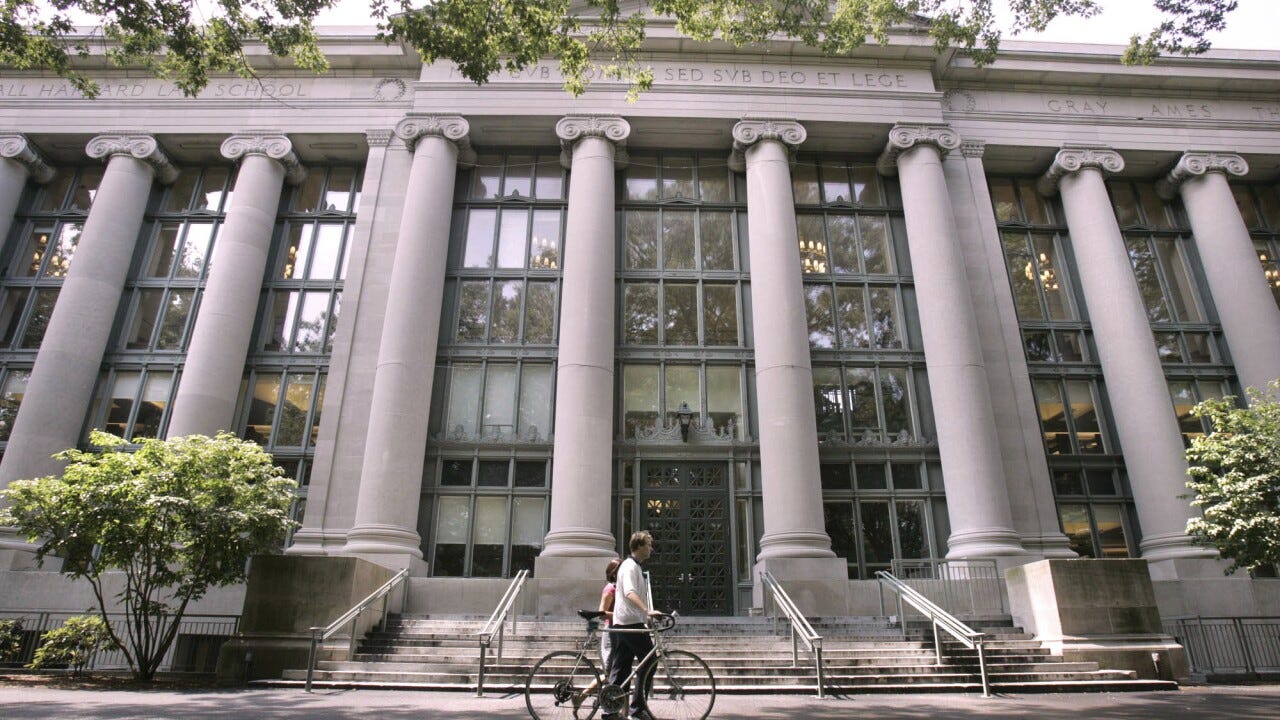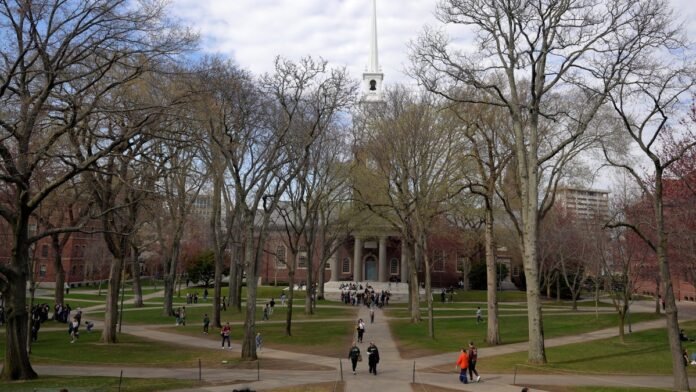The court hearing in Boston marked a crucial moment in the White House’s escalating conflict with Harvard.

Judge halts Trump plan to block foreign students from attending Harvard
A judge ruled that the Trump administration cannot block international students from attending Harvard University.
Scripps News
BOSTON – Harvard University urged a federal judge to order the Trump administration to restore about $2.5 billion in canceled federal grants and cease efforts to cut off research funding to the prestigious Ivy League school.
But a lawyer for the Trump administration told the judge the canceled grants reflect a government priority not to send money to institutions that practice antisemitism.
“Harvard prioritized campus protesters over cancer research,” said Michael Velchik, a senior lawyer at the U.S. Justice Department. He told the judge she shouldn’t be hearing the case in the first place, arguing the matter belonged in the U.S. Court of Federal Claims, which handles monetary disputes.
The court hearing before U.S. District Judge Allison Burroughs on July 21 lasted more than two hours, but ended without a ruling. The case marks a crucial moment in the White House’s escalating conflict with Harvard, which has been in the administration’s crosshairs after it rejected a list of demands to make changes to its governance, hiring and admissions practices in April.
The university, in nearby Cambridge, Massachusetts, says that hundreds of research projects, including some related to cancer treatment, infectious diseases and Parkinson’s would be in jeopardy unless the judge declares the grant cancellations unlawful.
The country’s oldest and richest university has become a central focus of the administration’s broad campaign to leverage federal funding to force change at universities, which Trump says are gripped by antisemitic and “radical left” ideologies.
Steven Lehotsky, a lawyer for Harvard, said the government has made wholesale cuts to research under the guise of combating antisemitism, but hasn’t identified any connection between the two.
“The administration has given no consideration to patients, the public at large and the harm of all this research being cut off,” Lehotsky told the court.
“The Trump administration’s proposition is simple and commonsense: Don’t allow antisemitism and DEI to run your campus, don’t break the law, and protect the civil liberties of all students,” White House spokesperson Harrison Fields said in a statement.
Among the earliest actions the administration took against Harvard was canceling hundreds of grants awarded to researchers under the premise that the school had not done enough to address harassment of Jewish students on its campus.
The Trump administration has since sought to bar international students from attending the school, threatened Harvard’s accreditation status and opened the door to cutting off more funds by finding it violated federal civil rights law.
Demonstrators ‘dismayed, shocked, disgusted’ by Trump admin actions
Thinking about how different her life might have been if her parents hadn’t come to the United States decades ago has a “visceral impact” on Salini Pillai.
The rising Harvard junior was among the dozens of people gathered outside the Boston courthouse after proceedings ended for the day. She was born in the United States, but her parents immigrated to the country in pursuit of higher education.
“They came here for all of the ideals that this country promises, and the fact that … people get to pick and choose who gets those freedoms and who doesn’t is something that I fundamentally disagree with and I find very scary,” she said.
The administration’s actions have had a noticeable impact on the campus, she said, adding that she believes her international friends are being “used as sort of a pawn” and that the university’s research has suffered without the support of federal funding.
Though some may question why Harvard, which has an endowment of more than $50 billion, needs financial support, Pillai said research often relies on government funding because of the “amount of capital that’s required to do certain amounts of groundwork and research.”
She added that the university acts as a type of litmus test for higher education more broadly.
“Even if Harvard isn’t the one that’s most impacted by this precedent, the downstream effects of … Harvard being subjected to these sort of funding cuts is … immense,” she said.
Several people at the rally were affiliated with Crimson Courage, an organization Harvard alumni formed in April to support the university amid the threats it faced.
Among them was Helen Fairman, a 1991 graduate who said the organization’s members have benefited from pursuing higher education in their respective lives and want to see others have the same opportunities.
“We know how important it is, and we’re all just banding together to try to … salvage what we can at Harvard and push back,” she said.
Evelyn Kim, a class of 1995 alumna who’s also involved in Crimson Courage, said higher education is in an “existential battle” against the Trump administration that’s left her “dismayed, shocked (and) disgusted.”
Like Pillai, Kim said her activism is about far more than backing her alma mater.
“This is not just a Harvard story,” Kim said. “This is a national story, it’s a local story, it’s an international story.”
Judge: halting grants for any reason is “major stumbling block”
Burroughs said she had problems with the government’s argument that it can terminate Harvard’s federal funding grants for any policy reasons.
“That’s a major stumbling block for me,” the judge said.
Burroughs also questioned the government’s stance that there doesn’t have to be an adversarial process to assess whether Harvard has taken steps to root out antisemitism on campus.
“If you can make this decision, that we’re going to withdraw all this funding for reasons oriented around speech, the consequences to that, in terms of constitutional law, are staggering to me,” Burroughs said.
Meanwhile, as part of Trump’s spending and tax bill, the Republican-led Congress increased the federal excise tax on Harvard’s income from its $53 billion endowment to 8% from 1.4%. Income from the endowment covers 40% of Harvard’s operating budget.
Harvard President Alan Garber said last week that the various federal actions since Trump returned to office in January could strip the school of nearly $1 billion annually, forcing it to lay off staff and freeze hiring.
Harvard has said it has taken steps to ensure its campus is welcoming to Jewish and Israeli students, who it acknowledges experienced “vicious and reprehensible” treatment following the onset of Israel’s war against Hamas in Gaza in October 2023.
But, Garber has said the administration’s demands have gone far beyond addressing antisemitism and unlawfully seek to regulate the “intellectual conditions” on its campus by controlling who it hires and who it teaches.
Those demands, outlined in an April 11 letter from an administration task force, included calls for the private university to restructure its governance, alter its hiring and admissions practices to ensure an ideological balance of viewpoints and end certain academic programs.
After Harvard rejected those demands, university officials say the administration began retaliating against the campus in violation of free speech protections under the First Amendment by abruptly cutting funding that officials say is vital to supporting scientific and medical research.
Burroughs, an appointee of Democratic President Barack Obama, has already barred the administration in a separate case from halting its ability to host international students. She is expected to issue a written ruling in the funding case in the coming weeks.
Trump has expressed optimism that Harvard will eventually settle with his administration. Fields on Friday said a good deal was more than possible and that the administration is “confident that Harvard will eventually come around and support the president’s vision.”
In court, the administration has argued that Burroughs lacks jurisdiction to hear the challenge and that the grant contracts made clear they could be canceled if the funded projects do not carry out federal government policy objectives.
Reuters contributed.
(This story was updated to add new information.)
